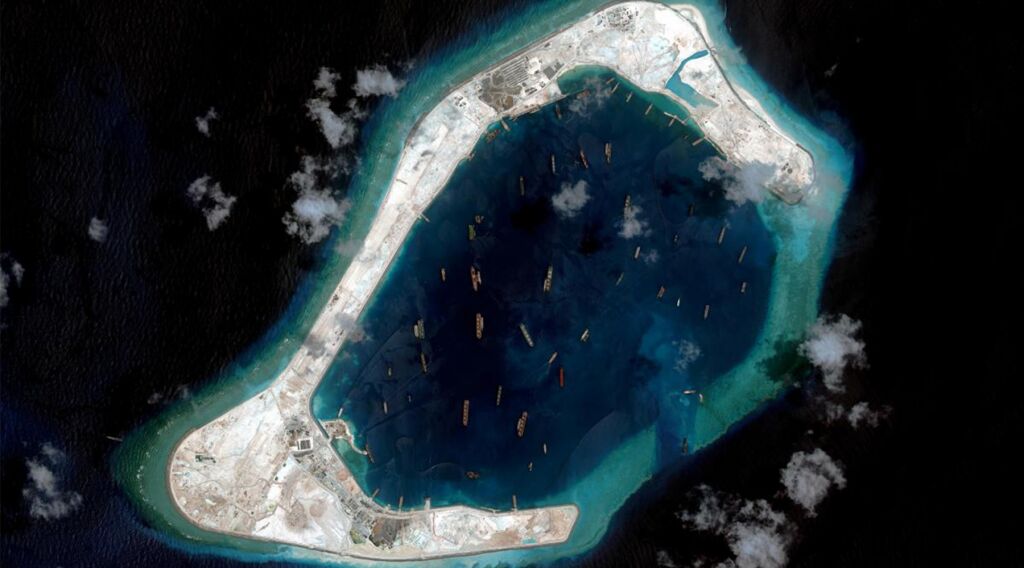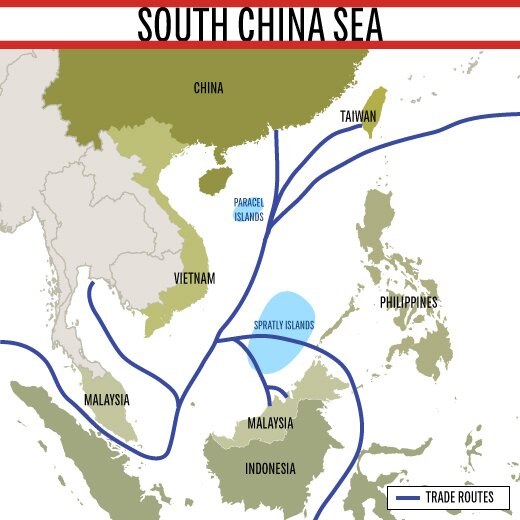
Rocket Launchers in the South China Sea
More weapons are being moved to disputed islands in the South China Sea, further escalating tensions between regional powers. Kept hidden from aerial surveillance until August 10, rocket launchers have apparently been moved to the Spratly Island chain. While not yet armed, the launchers could be operational within a number of days.
Surprisingly, it is not China moving the weapons in. It is Vietnam.
Quoting military and diplomatic sources, Reuters claimed that Vietnam has moved the launchers to five bases in the Spratly Islands.
No doubt prompted by Chinese expansion in the region, the Vietnamese are looking to shore up defenses and cement their own claims on the disputed islands.
With more than 2,000 miles of coastline to protect, Vietnam’s defenses are stretched thin. Chinese incursions in the Spratly Islands constitute a major threat, particularly to the southern regions of Vietnam.
The United States State Department acknowledged the report, stating, “We continue to call on all South China Sea claimants to avoid actions that build tensions.” But Washington undoubtedly favors a Vietnamese claim on the islands and is likely happy that Hanoi has chosen to take a stronger stance against China. As early as May, President Barack Obama announced that he was lifting the ban on the sale of weapons to Vietnam. The timing is very convenient.
Lifting the weapons ban swept aside years of postwar tension and opened the door for stronger military relations between the two countries. Needing local support to halt Beijing’s advance, the U.S. is looking to strengthen not only U.S. allies in the region but also China’s enemies.
Vietnam is certainly a lucrative market for U.S. sales. Arms imports rose a staggering 700 percent from 2011 to 2015, according to the Stockholm International Peace Research Institute. Geopolitically, Vietnam is crucial for control of the trade route through the South China Sea. With such intimate access, Vietnam could easily sway the flow of trade one way or the other.
China and Vietnam are not new to island-related conflict. In 1988, Chinese forces opened fire on Vietnamese soldiers who were attempting to raise a flag on the disputed Johnson South Reef. When the shooting stopped, 70 Vietnamese sailors and marines had been killed and two armored transports had been sunk.
The U.S. would no doubt like to capitalize on this bad blood and strengthen its relations with Vietnam, casting a stumbling block in front of the surging Chinese superpower.
But the U.S. is in for a rude awakening. A relationship with Vietnam is coming—not for America, however, but for China.
A Convenient Relationship
Despite the conflict in 1988, China and Vietnam normalized relations by 1991—a stunning turnaround.
In “The Chinafication of Asia,” Trumpet writer Jeremiah Jacques highlighted a bilateral defense dialogue between China and Vietnam in 2011. The two sides had agreed to boost collaboration in the area of naval and border guard forces, as well as military science research and training. As Jacques noted, “The landmark November defense talks show that the eastward shift in Vietnam’s alignment is already underway.”
Today, China is Vietnam’s largest trade partner and their trade relationship is still growing by leaps and bounds. In 2013, bilateral trade reached $50 billion—up 22 percent in a single year.

Jacques continued in his article:
Asian policymakers recognize that Beijing’s contributions are not out of benign generosity, but, as U.S. primacy in the region wanes, and as evidence of China’s military might multiplies, they see little choice but to align with Beijing.
Historically, nations like Vietnam, the Philippines and East Timor have depended on the U.S. or Australia for military assistance, but as Washington becomes distracted by pressures in the Middle East and elsewhere, Beijing is stepping into the void. These weaker Asian nations are beginning to read the writing on the wall and are positioning themselves for the inevitable demise of U.S. primacy in Asia.
“Soft power” coupled with a fast-advancing military is strengthening the relations between China and the smaller Asian nations, like Vietnam. All the while, the U.S. proves itself unwilling or incapable of stopping China’s policies in the South China Sea. If you were an Asian nation and you saw the scales tipping as dramatically as they are today, you might start to like China a little more too.
Nobody Trusts America
The Vietnamese rocket launchers in the Spratly Islands might appear on the surface to be a good sign for America, but dig deeper and the truth is quite the opposite.
Hanoi is ignoring America’s calls for de-escalation. The U.S. wants diplomacy, but Vietnam is sending rocket launchers. That alone paints a clear picture: The Asian nations don’t have faith in U.S. policy.
Nations like Vietnam are clinging to one of two illusions. First, that Washington has the ability to keep China in check. Or second, that they themselves have the ability—with or without the U.S.—to match China’s aggression. Either way, as Jacques pointed out, the writing is on the wall. The Asian nations are not waking up to U.S. ineptitude only, but to the fact that China is not going to be dissuaded.
And as the Trumpet wrote in 2010:
When a dominant nation comes to undisputed power in a region, the countries in its sphere of influence will, sooner or later, realize that it is in their best interests to ally themselves with the hegemon. If you can’t beat them, join them, they eventually decide.
Unification
Washington should certainly be worried, as should the world. China’s end game is not in the South China Sea. The way we can know this for sure is the same way we can accurately forecast the demise of American interests in the Asia-Pacific: prophecy.
Do you know that the Bible speaks directly of the rise of an Asian conglomerate—comprised of multiple “kings”? Do you also know that this power is set to join in a brief alliance with a European power? Your Bible indicates that these powers will lay siege to America! Prophecies in Daniel 12, Matthew 24, Hosea 5 and Ezekiel 4 all point to this climactic point in human history!
Our free booklet Russia and China in Prophecy explains this all in vivid detail. Read it for yourself. God has recorded this as a warning to the nations—and that includes you and me!
Armed with this knowledge, we can understand why the Asian nations are rallying and why the U.S. efforts at diplomacy are failing. And because we can see and prove where it is leading, it should fill us with excitement. After all, if you truly believe the afore-referenced prophecies written in your Bible, then you must believe what comes next!
Lasting Unification
The rise of the Asian nations is forecast to come directly before the return of Jesus Christ. The prophesied destruction is what it takes for God to reach this world! As Trumpet editor in chief Gerald Flurry concludes in “China Is Steering the World Toward War”:
God says three times in Ezekiel 2:6, Be not afraid! Don’t be afraid! Be not afraid! The people of America, Britain and Judah should be very afraid if they refuse to repent. But God tells those who are doing His work that they must not give in to fear. There are reasons why people fear to deliver that message, but God commands us to do it! He promises to give us all the power we need—and to reward us for obeying Him no matter what happens! …
All this prophesied destruction is what it will take for God to reach this world! After this, people will be ashamed—and they will get to know God! Ezekiel repeatedly talked about that inspiring conclusion (e.g. Ezekiel 6:7; 7:4; 11:10; 12:20; 13:9; 23:48-49, etc.). Yes, there is a lot of bad news when you consider what it takes to get people to the point of knowing God. But ultimately, the outcome is spectacularly good news!
Again, if you want to know more about the spectacular events that lead up to the return of Jesus Christ and how those events fit in world events today, be sure to read Russia and China in Prophecy.
